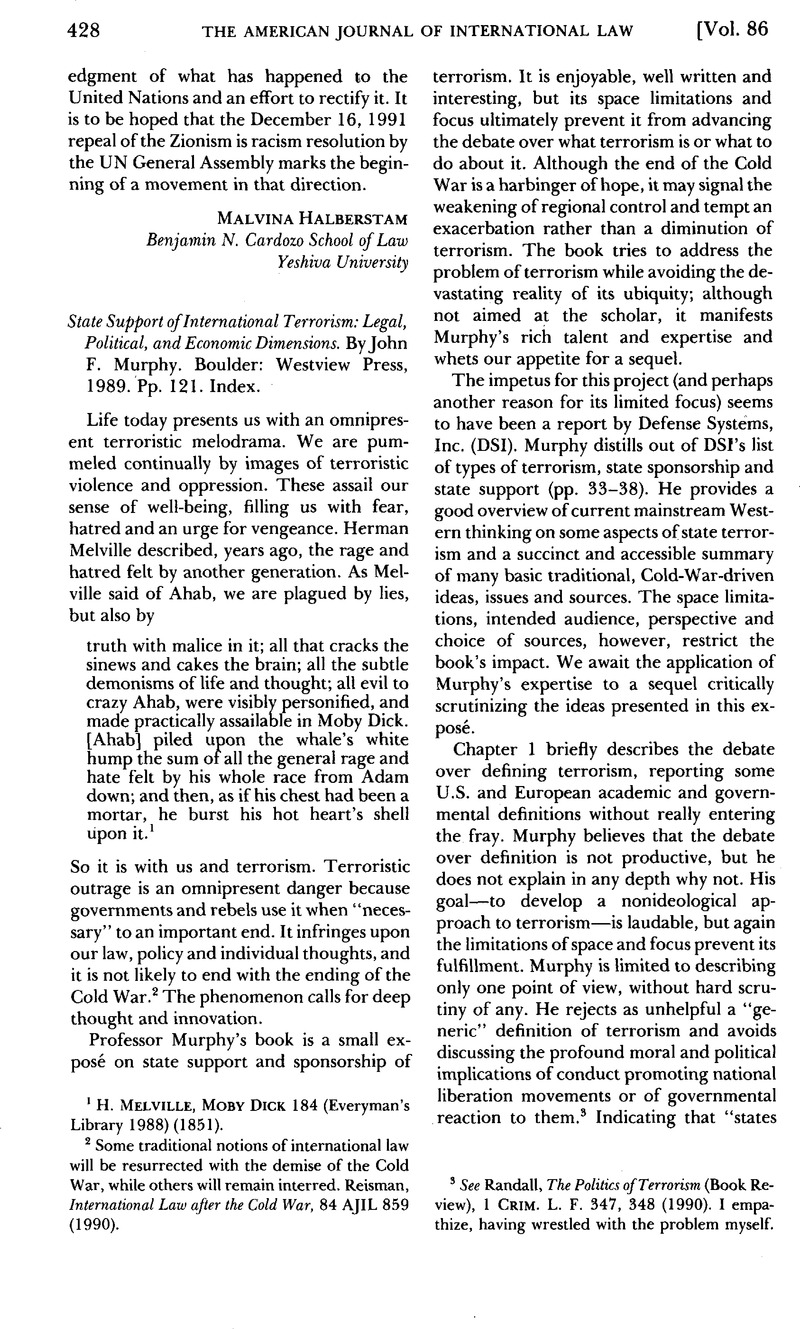No CrossRef data available.
Published online by Cambridge University Press: 27 February 2017

1 H. MELVILLE, MOBY DICK 184 (Everyman's Library 1988) (1851).
2 Some traditional notions of international law will be resurrected with the demise of the Cold War, while others will remain interred. Reisman, International Law after the Cold War, 84 AJIL 859 (1990).
3 See Randall, The Politics of Terrorism(Book Review), 1 CRIM. L. F. 347, 348 (1990). I empathize, having wrestled with the problem myself. See C. BLAKESLEY, TERRORISM, DRUGS, INTERNATIONAL LAW AND THE PROTECTION OF HUMAN LIBERTY(at press, 1992); Blakesley, The Modern Blood Feud: Thoughts on the Philosophy of Terrorism, 33 CATH. LAW. 177 (1990).
4 D. P. MOYNIHAN, ON THE LAW OF NATIONS 109(1990).
5 See Blakesley, Introduction to the Draft Convention for an International Criminal Tribunal 5 (presented to Eighth United Nations Congress on the Prevention of Crime and the Treatment of Offenders, 1990); 1 & 2 M. C. BASSIOUNI, INTERNATIONAL CRIMES: DIGEST/INDEX OF INTERNATIONAL INSTRUMENTS 1815-1985 (1986).
6 28U.S.C. §1350(1988).
7 18 U.S.C. §§1961-1968.
8 As done in United States v. Bagaric, 706 F.2d 42 (2d Cir. 1983).
9 Tel-Oren v. Libyan Arab Republic, 726 F.2d 774 (D.C. Cir. 1984), cert, denied, 470 U.S. 1003 (1985). Murphy discusses briefly Professor Koh's interesting article, Civil Remedies for Uncivil Wrongs: Combatting Terrorism Through Transna tional Public Law Litigation, 22 TEX. INT'L L.J. 169 (1987), but does not analyze in depth or cri tique the argument that such matters ought to be battled out in Congress rather than in the courts.
10 Argentine Republic v. Amerada Hess Ship ping Corp., 109 S.Ct. 683 (1989). It is likely that the decision was published after he finished writ ing the book.
11 See Randall, supra note 3, at 353-54. This will be even more interesting when Murphy is able to consider the Anti-Terrorism Act of 1990, S. 2465 (the Grassley-Heflin bill), to supplement 18 U.S.C. §2331, currently being discussed before the Senate Committee on the Judiciary, Subcommittee on Courts and Administrative Practice. This act would establish an express right to victims of terrorism to recover damages from its perpetrators. The Department of Justice and the State Department have argued that this act ought not to apply to any government or government official, because of the FSIA. See Zagaris, Senate Holds Hearings on Anti-Terrorism Act Designed to Provide Victims of Terrorism with Opportunities to Sue Terrorists, 6 INT'L ENFMT. L. REP. 293 (1990).
12 See McDougal & Reisman, Letter to the Editor, N.Y. Times, July 16, 1976, at A20; Randall, Book Review, supra note 3, at 353. * Mention here neither assures nor precludes later review.